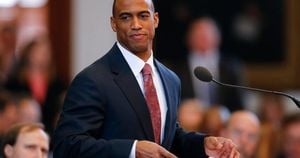Bangladesh's interim government, led by Nobel laureate Muhammad Yunus, is currently grappling with pressing issues including political instability, urgent calls for elections, and severe climate-related disasters. Just three months ago, following the ousting of the country's long-standing leader Sheikh Hasina during a student-led revolt, Yunus took on the challenging role of caretaker Prime Minister. His reign has been marked by tumult and adversity, which have now culminated in intense negotiations over climate funding at the COP29 summit.
At the summit held in Azerbaijan, Yunus, who is also celebrated for his groundbreaking work in micro-finance, expressed his frustration with the atmosphere of negotiation surrounding climate aid. He characterized the discussions as reminiscent of a "fish market," pointing to the indignity of nations like Bangladesh, which bear little responsibility for climate change, having to plead for assistance to mitigate problems largely caused by wealthier countries.
"I think that's very humiliatng, for nations to come and ask for money to fix...[the] problem others caused for them," Yunus remarked during his interview with AFP. He underscored the irony of the situation, arguing the burden should not fall on the vulnerable nations but rather on those who have contributed the most to the very crisis they are facing.
Rich countries have been hesitant to commit the substantial sums needed, with some developing nations seeking as much as $1 trillion annually to shift their economies to renewable energy and to adapt to the increasing frequency of extreme weather events. This reluctance is viewed as particularly galling by leaders from affected nations, who often find themselves relegated to simply making their case rather than receiving the necessary support outright.
Yunus’s concerns are reflective of Bangladesh's precarious position with respect to climate change. The nation, home to around 170 million people, is predominantly composed of river deltas and coastal areas making it extremely susceptible to flooding, cyclones, and the impacts of rising sea levels. Since his appointment, Yunus has overseen the aftermath of six destructive floods, each increasingly severe than the last. These environmental disasters have not only displaced hundreds of thousands but have also devastated the agricultural sector, destroying rice crops and other livelihood sources.
The recent climate negotiations have reportedly reached deadlock, causing considerable frustration among vulnerable nations like Bangladesh. Leaders attending the talks have left behind pressing domestic crises, only to return home without any significant advancements or firm commitments from wealthier nations. Yunus articulated the dire situation at home, lamenting how the latest series of floods have compounded the pressures faced by his government.
Despite the resounding need for change, Yunus is also treading the tenuous path of restoring democratic governance to Bangladesh. Since the fall of Hasina, calls for elections have intensified, and the interim leader understands the delicate balancing act at play. He has made it clear, though, there is no timeline for the much-anticipated elections; rather, he is focused on reaching consensus among various factions within the interim government.
"We are the interim government, so our period should be as short as possible," he said when discussing the governance timeline. Yunus emphasized the need to prioritize stability and safety for the population of Bangladesh, indicating his commitment to approaching the political transition with caution.
This dual focus on climate negotiations and political stability presents Yunus with formidable challenges. On one hand, he must advocate vigorously for support to combat climate change; on the other, he is expected to navigate the political waters as impatience for elections grows. The pressing demands of climate adaptation and political unrest are undoubtedly at odds, with each arena demanding his full attention.
Addressing climate justice, Yunus's statements at COP29 echo the sentiments held by many leaders from developing nations who feel the weight of environmental degradation squarely on their shoulders with little help from the very countries whose industrialization has led to these crises. According to Yunus, it's imperative rich nations step up and provide the necessary assistance to those who are suffering the consequences of climate change without having played significant roles in causing it.
The broader reaction from richer countries at the summit has often been seen as lukewarm, highlighting the disparity between their responsibilities and their commitments. While nations convene to discuss funding, activists argue the delays only prolong the suffering of millions who are experiencing the immediate fallout of climate change.
The mounting urgency for Bangladesh has not been lost on Yunus; he is acutely aware of the stakes involved as he calls for action and solidarity. Advocates for climate justice argue it’s no longer acceptable for wealthier nations to hesitate as vulnerable nations like Bangladesh suffer disproportionately.
Indeed, the impacts of climate change are nowhere more apparent than in Bangladesh, where agriculture and food security are deeply intertwined with the land’s delicate equilibrium. Yunus's calls for climate funding are tied to tangible realities at home, where recovery from floods and adaptation to changing weather patterns are pivotal for national survival.
Overall, Yunus's tenure as interim leader is underscored by resilience and urgency. While the backdrop of climate negotiations continues to loom large, the political dynamics he faces at home present their own unique challenges. Whether he can effectively navigate these waters, balancing the expectations of both climate assistance and democratic governance, remains to be seen.
Bangladesh is at the crossroads of climate struggle and political evolution, and Muhammed Yunus emerges not just as a leader but as a voice for those who face the brunt of crises not of their making. His experience as both a humanitarian and economist paints him not just as an advocate for change, but as one who understands the interconnectedness of economic justice and climate resilience. Going forward, the decisions made within the corridors of power at COP29 could reverberate through the lives of countless Bangladeshis, making this chapter one of immense significance.



